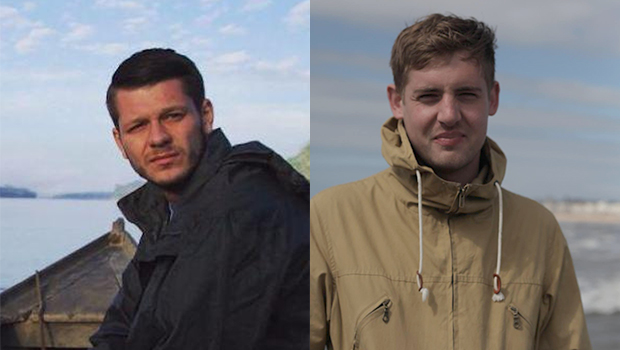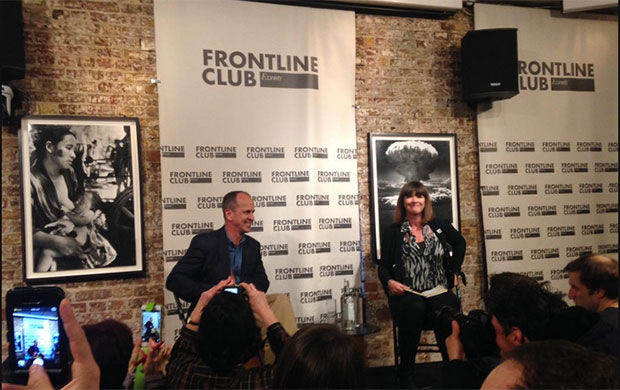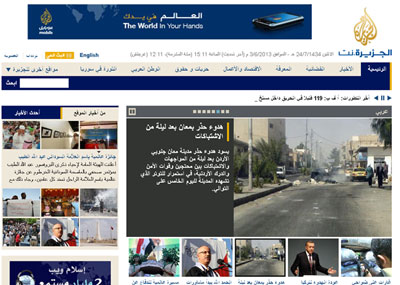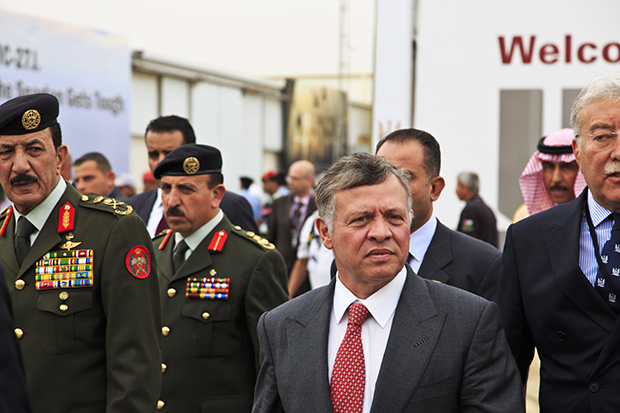1 Sep 2015 | mobile, News, Turkey, United Kingdom
The anti-terror charges against reporters for Vice News in Turkey are not isolated. In recent years, a number of countries have used broad anti-terror laws to restrict the freedom of the press.
Turkey

British journalists Jake Hanrahan, left, and Philip Pendlebury and Iraqi translator and journalist Mohammed Ismael Rasool were filming clashes between pro-Kurdish youths and security forces, according to Vice. (Photos: Vice News)
Two British journalists and a local fixer working for Vice News were charged on Monday 31 August in Turkey with “working on behalf of a terrorist organisation”. They will remain in detention until their trial, the date of which has not yet been announced.
The journalists Jake Hanrahan, Philip Pendlebury and Iraqi translator and journalist Mohammed Ismael Rasool were filming clashes between security forces and youth members of the Kurdistan Workers’ Party (PKK) in the south-eastern city of Diyarbakir on Thursday when they were arrested.
Turkey’s broad definition of terrorism means that any journalist reporting on PKK activities or Kurdish rights can be charged with the offence of making “terrorist propaganda” and jailed.
Index on Censorship Chief Executive Jodie Ginsberg said: “Coming just days after the unjust sentencing of three Al Jazeera journalists in Egypt, these latest detentions of journalists simply for doing their jobs underlines the way in which governments everywhere can use terror legislation to prevent the media from operating.”
Egypt

Peter Greste spoke to a Frontline Club audience about his arrest and detention in Egypt. (Photo: Milana Knezevic / Index on Censorship)
Egypt remains a cause for concern when it comes to press freedom: on 29 August 2015 Al Jazeera journalists Mohamed Fahmy, Peter Greste and Baher Mohamed were sentenced to three years in prison. The journalists were found guilty of of “broadcasting false information” and “aiding a terrorist organisation” – a reference to the Muslim Brotherhood.
The sentencing came just weeks after President Abdel Fattah el-Sisi’s government passed an anti-terror law setting a fine of up to 500,000 Egyptian pounds (£41,600) for journalists who stray from government statements or spread “false” reports on attacks or security operations against armed fighters.
Jordan
Jordan introduced a new “anti-terror” law in 2006 prohibiting, among other things, the engagement in “acts that expose the kingdom to risk of hostile acts, disturb its relations with a foreign state, or expose Jordanians to acts of retaliation against them or their money”. The charge carries a prison sentence of three to 20 years. The law was amended in 2014 to , broaden the definition of terrorism.
Interpretation of the law has been varied. According to the Committee to Protect Journalists (CPJ), in April 2015 a journalist was jailed for criticising the Saudi-led bombing of Houthi forces in Yemen. Another journalist was detained in July 2015 for breaking a recent ban on coverage of a terror plot. Earlier in 2015, an activist who criticised the royal family’s support of Charlie Hebdo on Facebook was sentenced to five months in jail under the anti-terror law.
Tunisia
One month after June’s terrorist attack on Sousse beach killing 38 tourists, for which ISIS claimed responsibility, Tunisia approved new anti-terror legislation.
Under the legislation, website editor Nour Edine Mbarki was charged in connection with publishing a photograph of a car that purportedly transported a gunman behind the beach attack. According to the CPJ, he was charged under Article 18 of the law with “complicity in a terrorist attack and facilitating the escape of terrorists,” which carries a prison term of between five and 12 years. He is currently awaiting a trial date.
Human Rights Watch said the new anti-terror bill “would open the way to prosecuting political dissent as terrorism, give judges overly broad powers, and curtail lawyers’ ability to provide an effective defence”.
Pakistan
Rights groups have long criticised Pakistan’s notorious anti-blasphemy laws for their effect on freedom of expression in the country. But strengthened anti terror legislation is also impacting the way journalists operate in the country.
In June, three Pakistani journalists were charged under the Anti-Terrorism Act, reportedly for covering the activities of a dissident politician, according to the Pakistan Press Foundation. A year before, a TV anchor was also charged under the law.
One to watch: Kenya
Following two separate attacks by al-Shabab militants in December, Kenya’s President Uhuru Kenyatta signed into law a new security bill that could curtail press freedom. Under the new law, journalists could face up to three years in jail if their reports “undermine investigations or security operations relating to terrorism” – or even if they published images of “terror victims” without police permission.
This hasn’t come into play yet – in February, the Kenyan High Court threw out several clauses, including those that could impact media freedom. The government has said it would consider lodging an appeal.
This post was written by Emily Wight for Index on Censorship
This article was posted on 1 September 2015 at indexoncensorship.org
10 Jun 2013 | Middle East and North Africa
Buffeted by internal and external forces, the Jordanian government’s recent move against hundreds of websites underscores the fragile nature of free expression in the country. Ramsey George reports
The country has seen an explosion of news sites that cover local politics and have become a thorn in the side of the government. A well-educated population and clever manoeuvres from the government have helped keep the political and social situation calm. At the same time, Jordan’s internet, media and cultural scenes have been growing — upsetting a delicate balance in the country.
Over the past several years, the government has repeatedly tightened efforts to censor and police the internet. Media observers see these actions as being in direct response to the rise of political news sites and expanding social media use among Jordanians.
Three high-profile cases have highlighted the Jordanian government’s attitude toward freedom of expression. Jamal al-Muhtasib was detained in 2012 for political reasons after posting an article about corruption. Mwafaq Mahadin and Sufyan al-Tell have been pursued by state prosecutors for publicly criticising Jordan’s foreign policy. While the cases were initially dismissed, all three face renewed charges and are back in court.
Related: Jordan blocks over 200 ‘unlicensed’ websites
Middle East and North Africa
Free speech in post-Gaddafi Libya | Social media grows across the Gulf | Free speech in Tunisia: New year, same fears | What future for free speech in the new Egypt?
Recently, amendments made to the Kingdom’s notorious press and publications law have demonstrated the state’s intentions. The amendments have forced sites to register, purchase a license from the press and publications department and assign an editor-in-chief who is a member of the Jordan Press Association (JPA). Moreover, the amendments hold new websites responsible for any “inappropriate” comments left on their platforms, and give the government permission to force the deletion of comments deemed “irrelevant” to a particular article. These requirements severely restrict news websites from joining the media landscape in Jordan and impact the ability of existing sites to function. Additionally, the amendments to the press and publications require significant resources from the government to enforce.
News sites would also have to store comments and user information for at least six months. Meanwhile, the government has also declared its intentions to formulate a new telecommunications law that would force Internet Service Providers (ISPs) to block pornography sites, or any material the government believes to be in contradiction to the country’s moral fabric.
In 2010, the government attempted to block over 50 news sites throughout government buildings, citing a 30-day official study that claimed public sector employees were wasting three hours per day surfing such sites. This policy was coupled with the introduction of a controversial Cyber Crimes draft law that included articles targeting news sites, including the ability to impose fines on media outlets publishing articles deemed to be “defamatory” or allow the authorities to raid offices and confiscate computers.
After pressure from interest groups that included bloggers, cyber activists and journalists, these articles were removed from the law, and the government’s policy of blocking news sites was reversed. Nevertheless, the Jordanian government has continued to find new ways to restrict and regulate new media in the country–especially in the post-Arab Spring era.
The context of these moves must also be considered, and there is perhaps nothing more that stands out as a contributing factor the state’s newfound direction than the advent of the Arab Spring and the lingering presence of domestic discontent. Jordanians, for instance, have taken to Facebook and Twitter to form new groups and hashtags, while using these platforms to mobilize people, create discussion, launch protests, or simply voice discontent with the economic, social and political status quo. By some estimates, there are over 2.4 million Facebook users in Jordan, and this includes a quarter million new users in the past six months alone. With some of the biggest Jordanian pages and groups on Facebook being media related or political in nature, both the usage and user base on Facebook alone has changed dramatically since the Arab Spring began, with Jordanians finding a new political voice, and articulating it online.
Ramsey George is a co-founder of 7iber.com, a citizen media platform based in Amman, Jordan.
3 Jun 2013 | Digital Freedom, Middle East and North Africa
The Jordanian government began blocking over 200 websites on Sunday for failing to obtain licenses under a strict set of new guidelines, Ruth Michaelson reports.
Four amendments to the country’s press and publications law gave the government the power to censor sites that fail to comply, close outlet offices and hold the site owners responsible for posted comments. The changes to the law, which were introduced in 2012, sparked a backlash that saw 1,000 Jordanian sites stage a blackout on 29 Aug 2012. Undeterred, the government implemented the changes.
According to press reports, 281 sites have so far been targeted. The pro-government Jordan Times quoted Fayez Shawabkeh of the Press and Publications Department (PPD) as saying that his department was responsible for compiling the list of “unlicensed” sites, which was forwarded to the Telecommunications Regulatory Commission (TRC). In turn, the TRC pressured the country’s service providers to begin implementing the blocks.
It became immediately clear on Sunday that the block included many sites that fall outside the category of what Jordan Times described as “local broadcasters”. The website arabianbusiness.com reports that “some of the more prominent pages that have apparently been blocked by the government include Qatari news portal Al Jazeera, Time Out magazine, erotic publication Penthouse and the site of the Muslim Brotherhood in Jordan.”

Al Jazeera is among the sites being blocked in Jordan for failure to obtain a license.
The amended press and publications law requires websites to obtain licenses similar to the rules that require printers to register, without regard to the differences between the mediums.
A rundown of the law on the website tamimi.com states that: “Jordan’s amendments to the press and publications law mean that owners of electronic publications, irrespective of where their offices are located, must take care when allowing their websites to be viewed in Jordan. While the amendments only contain four changes to the press and publications law, under the new legislative regime electronic publications that contain news, press reports, press releases and comments have an additional obligation to register, obtain a license and actively monitor the content of the publication in order to ensure that they are in compliance with the laws in Jordan.”
Therefore, the amendment is not simply regulating Jordanian sites, but any site available to view in Jordan- essentially requiring the entire Internet to comply with what appears to be a rather opaque and poorly defined category of regulations. In order to stay within the law, any site that wishes to be viewed in Jordan has to obtain a license and police the content of the site, irrespective of where it is in the world. The Jordanian government has “stressed that the law is aimed to organize the sector and provide legal guarantees against slander and unlawful material” according to AmmonNews. Given the flexible and rather expansive language of law, there also appears to be few guarantees or safeguards that the government won’t block a site arbitrarily or simply amend the law to block sites that it wishes to target.
The stated framework of this law also raises questions as to whether sites like Al Jazeera, Penthouse, Time Out or the Muslim Brotherhood would ever be able to obtain licenses to be viewed in Jordan. Last year, the country’s parliament considered a law that would have banned the Muslim Brotherhood from participating in the then upcoming election, on the basis of banning “religious parties” and Al Jazeera has sometimes been regarded as the fuel of anti-government protests across the Middle East. Penthouse would undoubtedly fall foul of public decency laws. It is unclear precisely what threat Time Out poses.
It is also unclear at present whether the Jordanian authorities will continue to ignore to the intense pressure from press freedom and civil society groups such as the Jordanian Centre for Defending the Freedom of Journalists, who described the law as “storm[ing] the freedom of electronic media”. Yet on the same day that the new law went into affect, King Abdullah launched his “Democratic Empowerment Programme”, dubbed Demoqrati, which according to The Jordan Times “is founded on development-boosting values such as the rule of the law, rejection of violence, acceptance of others, dialogue and accountability. It is also meant to stimulate civil society institutions to play their role as a key supporter of citizens and issues of concern to the public.” It appears that the Kingdom is yet to regulate irony.
1 May 2013 | Newswire
Preliminary research from a survey of nearly 10,000 Arab respondents has found that while most support the right to free expression online, they are apt to believe that the internet should be regulated, according to the researchers.
The survey — a joint effort between researchers at the Qatar campus of the US-based Northwestern University and the World Internet Project — explored media usage in the Arab world. Participants were drawn from eight Arab nations: Egypt, Tunisia, Bahrain, Qatar, Saudi Arabia, Jordan, Lebanon and the United Arab Emirates.
The survey questioned participants’ perceptions of the news media, finding that 61 per cent thought the “quality of news reporting in the Arab world has improved over the past two years.” Media credibility declined in countries that experienced revolutions during the Arab Spring. The Saudi Arabian respondents gave their media outlets high marks with 71 [per cent agreeing with the statement, “The media in your country can report the news independently without interference from officials”.
Overall, the survey found high Facebook penetration among respondents who used social media. Ninety-four percent of the social media users had Facebook accounts, 47 per cent used Twitter and 40 per cent used Facebook. Among the Bahrain social media users, 92 per cent had a Facebook account, while just 29 per cent of the Egyptian respondents did.
The survey aimed to assess the use of media — TV, radio, newspapers, books, web — and levels of trust respondents had toward the sources. It also sought to guage how the respondents used the internet to communicate and conduct transactions like banking or purchases.
The results can be accessed at Arab Media Use Study.




